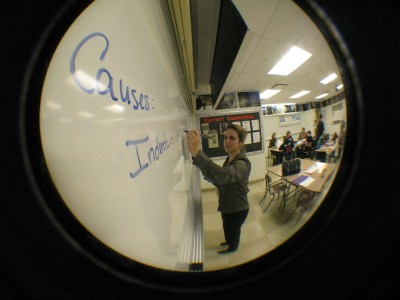Haris Durrani ’11
Opinions Editor

With Advanced Placement tests round the corner, AP World History will complete its first year at Staples this June. While the College Board’s curriculum may attempt to tackle too much material, many students and teachers agree it is a strong first step in the Social Studies Department’s shift toward global education.
“It’s not the European man’s perspective,” Carol Avery, an AP World History teacher, said. “It’s the global perspective.”
David Willick, the other AP World teacher, mentioned the contrast between an Area Study and AP World.
“You get a big picture,” Willick said. “It’s not just what’s happening. It’s everything. Students are getting that.”
Students said the class teaches topics never covered in other classes.
“The last time we talked about globalization was making paper-mâché pyramids in fifth grade,” Gabe Block ’11, a student in Avery’s period four class, said.
Students learn of religions such as Buddhism, Hinduism, and Islam and of other governments they were never taught, according to Matt Dejana ’11, a student in Willick’s period six class.
“I get to try learning about different places other than [what I learned] in Western,” Dejana said.
However, because the class spans such a large amount of time—from 8000 BC until present day according to the College Board—it makes for a fast pace and, to some, a lack of depth.
Scott Grundei ’10, a student in Avery’s period four class, said there is an “inherent problem” with the College Board’s curriculum.
“It’s an attempt to distill the entire history of the world in 150 school days,” Grundei said. “There’s definitely some hubris in that.”
According to Grundei and Block, although the class is taught well, it loses detail because students skim through most events.
“There’s so much that happens in world history that if you test 45 minutes every day you can’t accurately assess our knowledge,” Block said.
Willick acknowledged World is not as in–depth as other APs, but he added that the “depth is on the student”—how much he or she studies outside of class.
“You can say the same thing [on loss of depth] about anything,” Willick said, citing issues with teaching two centuries of U.S. history in one school year.
Many, including Block and Grundei, said the sacrifice of individual events in favor a larger perspective on world history can still promote a degree of critical thinking.
“You discuss the themes more than what happened [in history],” Block said.
Grundei did say that despite the AP curriculum’s pitfalls, this type of thinking almost makes AP World History a philosophy class.
He mentioned the AP test’s “compare and contrast essay” which, according to Avery, is unique to the AP World test. She said the essay asks students to discuss how part of the world changes over time.
“You’re able to connect everything you’ve learned,” Dejana said.
According to Willick, the class is a learning experience for him as well.
“I like it,” Willick said. “It’s a challenge. Just like anything, you learn a lot from teaching it.”
Avery shared a similar excitement for teaching a new subject, and also said there are numerous aspects of the class she would like to improve.
“It’s the first year we taught it,” Avery said. “There’s always progress.”
According to students, Avery and Willick have successfully jumpstarted AP World.
“With every new subject there is obviously room for improvement,” Lucy Stanley ’11, a student in Willick’s period six class, said. “But I think the teachers have done a good job.”
Kelly Bohling ’11, also from Willick’s period six class, said more students are drawn to take World for the 2010–11 school year.
“Everyone wants to take it next year,” she said.
Willick mentioned the need to teach World History to a variety of students.
“You want to go to all levels, not just AP kids,” he said.
However, the Social Studies Department’s move toward “global” education might not fare well for Western Humanities classes.
“I don’t think there is a future for Western Humanities,” Avery said. “It’s great to teach a course on just one part of the world, but to teach ninth graders about only Europe and the US is ridiculous.”













































